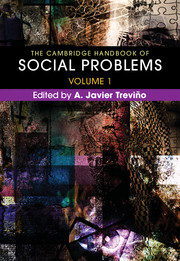Book contents
- The Cambridge Handbook of Social Problems
- The Cambridge Handbook of Social Problems
- Copyright page
- Contents
- About the Contributors
- Introduction
- Part I General Concerns and Orientations in the Study of Social Problems
- Part II Historical and Theoretical Issues in the Study of Social Problems
- Part III Problems of Discrimination and Inequality
- Chapter 17 Racism
- Chapter 18 Immigration
- Chapter 19 Gender Inequality
- Chapter 20 Sexualities and Homophobia
- Chapter 21 Poverty and Income Inequality: A Cross-National Perspective on Social Citizenship
- Chapter 22 Housing Market Discrimination
- Chapter 23 Hunger and Food Insecurity
- Chapter 24 Ageism, Past and Present
- Chapter 25 Disabilities
- Part IV Problems of Institutions
- Index
- References
Chapter 17 - Racism
from Part III - Problems of Discrimination and Inequality
Published online by Cambridge University Press: 16 March 2018
- The Cambridge Handbook of Social Problems
- The Cambridge Handbook of Social Problems
- Copyright page
- Contents
- About the Contributors
- Introduction
- Part I General Concerns and Orientations in the Study of Social Problems
- Part II Historical and Theoretical Issues in the Study of Social Problems
- Part III Problems of Discrimination and Inequality
- Chapter 17 Racism
- Chapter 18 Immigration
- Chapter 19 Gender Inequality
- Chapter 20 Sexualities and Homophobia
- Chapter 21 Poverty and Income Inequality: A Cross-National Perspective on Social Citizenship
- Chapter 22 Housing Market Discrimination
- Chapter 23 Hunger and Food Insecurity
- Chapter 24 Ageism, Past and Present
- Chapter 25 Disabilities
- Part IV Problems of Institutions
- Index
- References
Summary
Racism is an ideology or action predicated on the grouping and differential valuation of human beings based upon assumed inherent qualities. Race, the categorization of human beings, was historically a European project that has been mobilized to rank, control, contain, organize, and exploit people and societies. As race developed through the processes of globalization – including colonization, slavery, nation building, and capitalism – it became both a vehicle and a commonsense explanation for human exploitation. Deploying racial categories is inherently racist, and yet, historically created categories frame communities and identities that are needed for solidarity in the struggle against racial injustice. Racism can be understood through examining the creation and enactment of the concept of race over the past four centuries at the intersection of science, nation building, and shifting discourse.
- Type
- Chapter
- Information
- The Cambridge Handbook of Social Problems , pp. 303 - 318Publisher: Cambridge University PressPrint publication year: 2018
References
- 1
- Cited by

